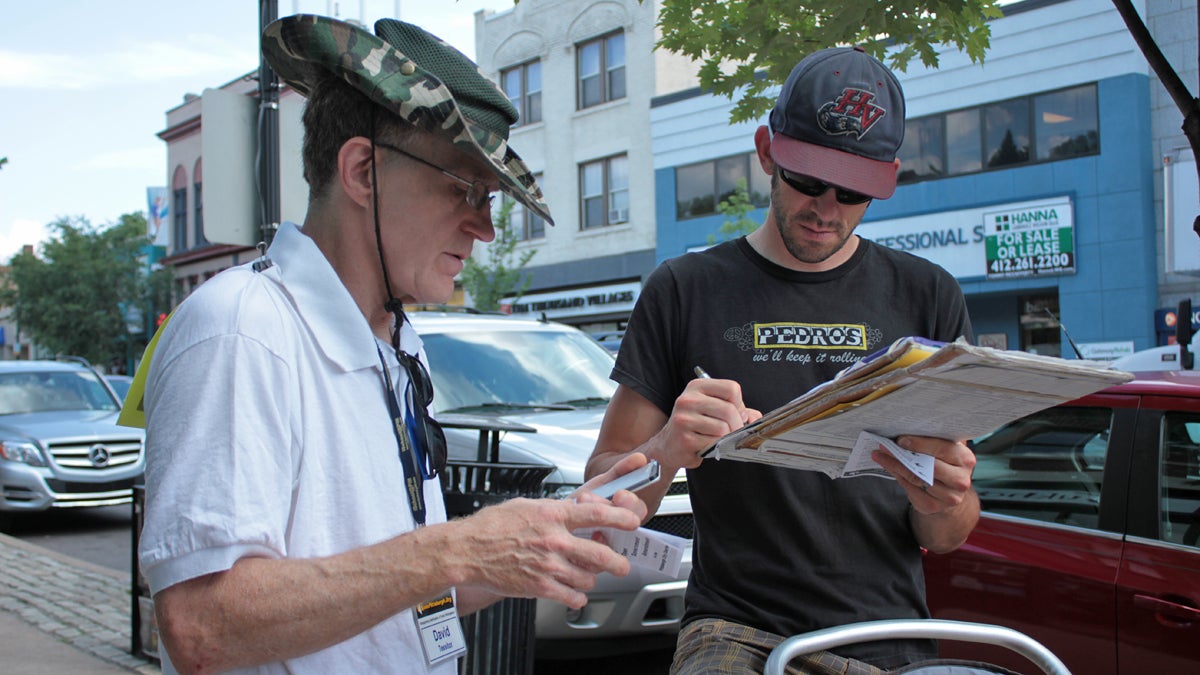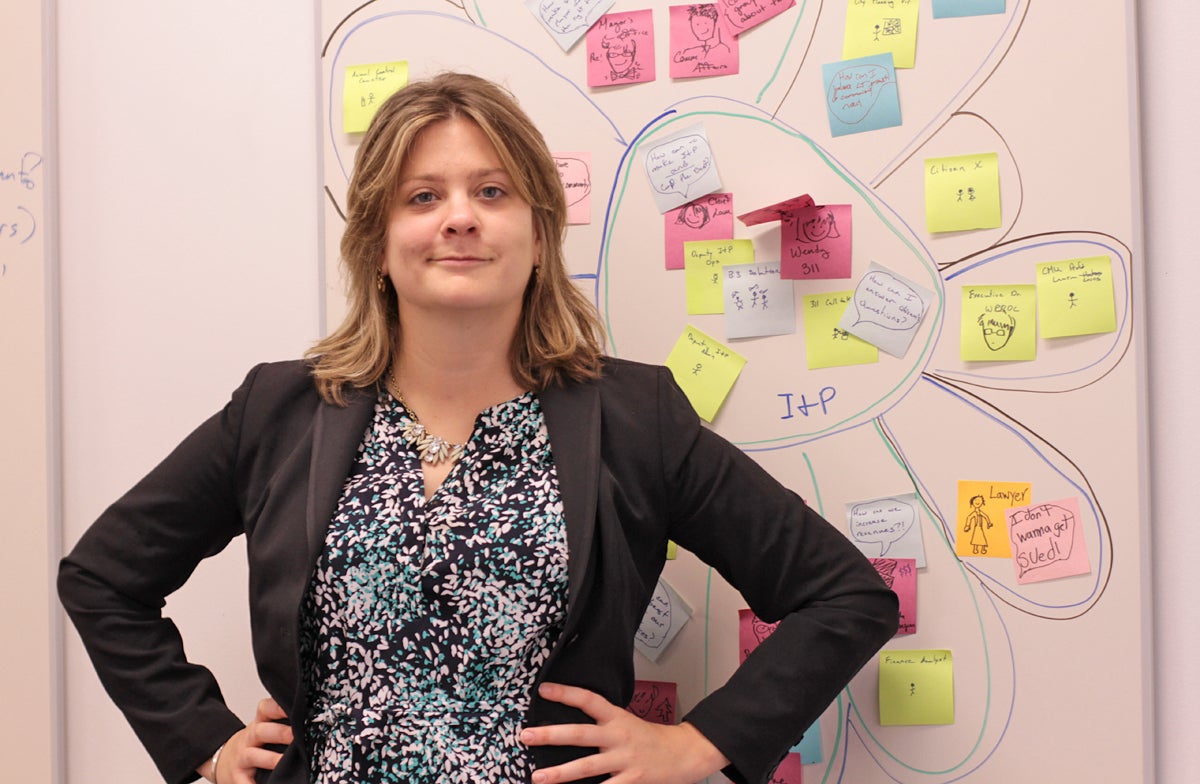Pittsburgh group aims to write citizens into the middle of government

David Tessitor (left)
Across Pennsylvania, holding government accountable takes various forms, but OpenPittsburgh.org wants to put people in the middle of the action.
“Are you registered to vote?” Dave Tessitor asked a man as he walked past the library in Pittsburgh’s Squirrel Hill neighborhood.
“Yes,” the man said, not stopping.
Tessitor fell in step. “We’re collecting signatures to put a referendum on the November ballot,” he said, walking up the street with the man. He only turned back several blocks later, the cargo pocket of his shorts one pamphlet lighter. He shrugged and smiled. And then a young couple came out of the library. “Excuse me, are you registered to vote?”
Tessitor chairs OpenPittsburgh.org, a group that wants to add an open government amendment to the city of Pittsburgh’s home rule charter.
Open government is an ethos that promotes “transparency, participation, and collaboration,” and it depends on the existence of open data: information made available to the public for free, without restrictions. In municipalities that publish data, residents can examine the workings of government and demand that it be accountable and transparent.
Across Pennsylvania, holding government accountable takes various forms, but OpenPittsburgh.org wants to put people in the middle of the action. The proposed open government amendment calls for a lot of things, but if the referendum passes, what would be most immediately different is the creation of a Citizen Advisory Panel.
“Elected officials don’t have 24 hours a day to listen to everybody,” said Tessitor.
So the Citizen Advisory Panel, open to any interested city resident, would be a conduit for citizen concerns, providing a one-stop shop for receiving community input and channeling it to City Council, Tessitor said.
“This creates a situation which is ongoing continuously and can look at any issues that may not even be considered right now on the agenda of the public officials.”
For instance, if you were concerned about energy use at city senior centers, you could bring the data published by the city to the Citizens Advisory Panel, and they could request to make a presentation to City Council. Instead of finding the time to speak at a public meeting, follow up with your city council representative, and write letters, the Citizens Advisory Panel would provide institutional follow-through. Tessitor said the amendment isn’t revolution, but evolution.
“The ability to bring together the citizenry to work together from the grassroots level up,” he said.
Beyond data
Laura Meixell is analytics and strategy manager for the city of Pittsburgh and helped to create its open data law, which requires the city to publish much of its data. For example, you can see what it takes to keep the lights on in municipal buildings, or an inventory of campaign finance contributions.
But on the window of her sixth-floor office she’s written in blue, dry-erase marker: “Transparency is not enough.”
Meixell said helping residents actually engage with their government goes beyond open data.
“It also has to do with interpretation and helping them understand the processes and the people that are behind those individual data points,” she said.
To do that, she and her team have created new ways for Pittsburgh residents to monitor the day-to-day work of running the city. Say there’s a baby-sized pothole on your street; you can download the MyBurgh app to notify the city of that pothole, accompanied by a photo, and receive updates. Alternatively, you can tweet at 3-1-1, and someone will respond to your concern.
Tessitor said the city is doing some nice things, but there needs to be something more: a mechanism that allows for meaningful interaction between citizens and their government, a substantive give and take.

Laura Meixell is analytics and strategy manager for the city of Pittsburgh. (Margaret J. Krauss/For Keystone Crossroads)
Engaging the public
Innovating how people interact with government is important, says David Thornburgh. He’s president and CEO of the Philadelphia government watchdog group Committee of Seventy.
“We’re in an age where there’s so many different ways to comment, to participate, to engage, that we ought to be looking for and experimenting with different ways of getting citizen input,” he said.
But with technology allowing more people to be watchdogs, Thornburgh isn’t sure that creating new government protocol is the best way to encourage collaboration.
“If there’s sufficient political value in being more forthcoming with data or transparency and so forth, that can be very powerful, without the strings and ties that can bind an organization,” he said.
Even good process can fall by the wayside, said Reading city clerk Linda Kelleher. Reading has had a Citizens Advisory Board on the books since the late 1960s. But it lapsed sometime in the late 1970s before being revived briefly during the administration of former Mayor Vaughn D. Spencer.
“The initiative was meant to provide some dialogue between the government and the citizens,” said Kelleher. “But the former administration believed that this group was brought back together to push initiatives down from the government to the citizens.”
Kelleher said communication between citizens and government is always a good thing but “Government depends on the people involved.” Reading’s Citizen Advisory Board agreed to stop meeting when differences of opinion with the administration couldn’t be resolved.
In Philadelphia, Thornburgh said making room for more engagement with government is a collective effort. From the inside, a Chief Integrity Officer advises government how to be responsive to citizens, and an Inspector General enforces that. Then from the outside, ordinary Philadelphians stay alert to foul play and get vocal about it.
“People need to see that change can occur,” he said. “That good people stepping up at the right time can make a difference.”
Demanding transparency
Protesters gathered recently in Center City Philadelphia to demand transparency from the Democratic National Convention Host Committee, calling for the release of its fundraising and donor details. With the convention just weeks away, some worry the city will be forced to pick up the event’s tab, as it did after Pope Francis’ visit last September, at a cost of $8 million. The Philadelphia Sunshine Project, an initiative of Philadelphia publication The Declaration, demanded the DNC host committee’s records in the spring, but the request was denied. Declaration editor Dustin Slaughter then turned to the state’s Right-to-Know Law (RTKL) and the Office of Open Records, which on June 14 ordered the host committee to release its records.
The RTKL allows citizens to press for information when governments or political bodies are less than forthcoming. But many Pennsylvania governments are striving to be more open and collaborative, said Donald Gilliland, president of Pennsylvania’s Freedom of Information Coalition.
“Increasingly, I’ve seen this over the last 20 years, particularly local governments, make an effort to demonstrate their transparency,” he said.
But those efforts surpass the demands of Pennsylvania’s Right to Know law, said Gilliland. As far as he knows there aren’t any other municipalities in Pennsylvania doing what OpenPittsburgh.org proposes to do — write people into the official structure of government.
“It’s up to the citizens and their government to figure out how far beyond the existing law they want to go,” he said.
To be placed on the November ballot, OpenPittsburgh.org’s amendment requires about 8,000 signatures. The official collection period began June 21, and will run for seven weeks.
WHYY is your source for fact-based, in-depth journalism and information. As a nonprofit organization, we rely on financial support from readers like you. Please give today.


